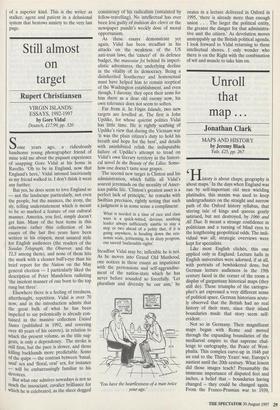Still almost on target
Rupert Christiansen
VIRGIN ISLANDS: ESSAYS, 1992-1997 by Gore Vidal Deutsch, £17.99, pp. 320 Some years ago, a ridiculously handsome young photographer friend of mine told me about the piquant experience of snapping Gore Vidal at his home in Ravello. 'Oh to be in England, now that England's here,' Vidal intoned lasciviously as my friend walked in. I don't think it went any further. But yes, he does seem to love England so — not the landscape particularly, not even the people, but the nuances, the irony, the sly, telling understatement which is meant to be so marked a feature of our cultural manner. America, you feel, simply doesn't get him. Many of the best items in this otherwise rather thin collection of his essays of the last five years have been written in his crispest, most assured style for English audiences (the readers of the Sunday Telegraph, the Observer, and the TLS among them), and none of them hits the mark with a cleaner bull's-eye than his brief report for the Nation on the May general election — I particularly liked the description of Peter Mandelson radiating `the insolent manner of one born to the top rung but three'. Elsewhere there is a feeling of tiredness, afterthought, repetition. Vidal is over 70 now, and in the introduction admits that the great bulk of what he has been impelled to say polemically is already con- tained in the massive collection United States (published in 1992, and covering over 40 years of his oeuvre), in relation to which the present volume, as the title sug- gests, is only a dependency. The stroke is still firm, but the pace is slower, and those killing backhands more predictable. Some of the quips — the contrast between 'banal, anal' sex and 'floral, oral' sex, for instance will be embarrassingly familiar to his devotees.
But what one admires nowadays is not so much the insouciant, cavalier brilliance for which he is celebrated, as the sheer dogged consistency of his radicalism (untainted by fellow-travelling). No intellectual has ever been less guilty of trahison des clercs or the newspaper pundit's weekly dose of moral opportunism.
As these essays demonstrate yet again, Vidal has been steadfast in his attacks on the weakness of the US anti-trust laws, the 'cancer' of its defence budget, the mauvaise foi behind its imperi- alistic adventures, the underlying decline in the vitality of its democracy. Being a disinherited Southerner and homosexual must have helped him to remain sceptical of the Washington establishment, and even though, I daresay, they open their arms for him there as a dear old enemy now, his own tolerance does not seem to soften.
Far from it. In Virgin Islands, two new targets are levelled at. The first is John Updike, for whose quietist politics Vidal has little time. He is rightly scathing of Updike's view that during the Vietnam war `it was the plain citizen's duty to hold his breath and hope for the best', and details with uninhibited relish the indisputable failure of Updike's attempt to tread on Vidal's own literary territory in the histori- cal novel In the Beauty of the Lilies. Some- how one doesn't taste sour grapes. The second new target is Clinton and his administration, which fulfils all Vidal's sourest jeremiads on the morality of Amer- ican public life. 'Clinton's greatest asset is a perfect lack of principle,' he remarks with Swiftian precision, rightly noting that such a judgment is in some sense a compliment:
What is needed in a time of race and class wars is a quick-witted, devious, soothing leader always sufficiently nimble to stay a step or two ahead of a polity that, if it is going anywhere, is heading down the eco- nomic scale, jettisoning, in its dizzy progress, our sacred 'inalienable rights'.
Steadfast Vidal may be; inflexible he is not. As he moves into Grand Old Manhood, one notices in these essays an impatience with the pretensions and self-aggrandise- ment of the nation-state which he has never before sounded so forcefully. 'Let pluralism and diversity be our aim,' he You have the heartlessness of a man twice your age.' orates in a lecture delivered in Oxford in 1995, 'there is already more than enough union . . . The larger the political entity, the greater the danger for that administra- tive unit the citizen.' As devolution moves unstoppably up the British political agenda, I look forward to Vidal returning to these intellectual shores. I only wonder who there is on the Right with the combination of wit and muscle to take him on.


















































 Previous page
Previous page